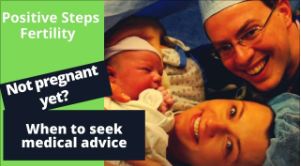Miscarriages are a weighty, emotionally and physically draining aspect of infertility. They are also more common than you might think, with around 10-20% of known pregnancies ending in miscarriage.
With stats like that, expectant mothers can be filled with anxiety, and begin to worry what a potential miscarriage could mean for their future fertility and overall health. Among many questions, a common concern is to what extent recurrent miscarriages affect a woman’s ability to get pregnant and deliver a healthy child. Put briefly, there is often much to be hopeful about for those who have experienced the pain of a miscarriage.
Today, we’ll discuss how miscarriages factor into fertility and a woman’s health, as well as clarify what multiple miscarriages entail for future conception.
1. Is it harder to get pregnant after a miscarriage?
In most cases, pregnancy remains viable after a miscarriage. Miscarriage is fairly common and does not mean that you are infertile or unable to have a normal pregnancy in the future.
According to the Mayo Clinic, you can ovulate and become pregnant as soon as two weeks after a miscarriage. However, you may want to wait until you feel emotionally and physically ready for pregnancy after miscarriage. A fertility specialist can help you decide when to try again and offer guidance on reducing the risk of another miscarriage.
The good news is that most people who have one miscarriage will go on to have a successful pregnancy. The American Congress of Obstetricians and Gynecologists (ACOG) reports that less than 5% of women will have two miscarriages in a row. Around 1% will have three or more.
If you have had two or three miscarriages in a row, your chances of having a healthy pregnancy are lower, but still possible. You may need some tests to find out the cause of your recurrent miscarriages and get treatment if needed. Again, seeking out a specialist is your best choice to help determine factors that are affecting your fertility.
Some factors that can increase the risk of miscarriage include:
- Age: The risk of miscarriage increases with age, especially after 35 years old.
- Chromosomal abnormalities are problems with the number or structure of the chromosomes in the egg or sperm that cause the fetus to develop abnormally. This is the most common cause of miscarriage.
- Uterine or cervical problems: These are structural or functional issues with the uterus or cervix that prevent the fetus from implanting or growing properly. Examples include fibroids, polyps, scar tissue, septate uterus, or incompetent cervix.
- Medical conditions: Some health problems in the mother can affect the pregnancy, such as diabetes, thyroid disorders, autoimmune diseases, infections, or blood clotting disorders.
- Lifestyle factors: Smoking, drinking alcohol, using drugs, being overweight or underweight, or having too much caffeine can also increase the risk of miscarriage.
2. Can you have a baby after multiple miscarriages?
This is a question that many women who have experienced recurrent pregnancy loss (RPL) may ask themselves. RPL is defined as having two or more consecutive miscarriages before 20 weeks of gestation.
The good news is that many women with RPL can have a successful pregnancy in the future, by some estimates, as many as two-thirds will. The chances of having a live birth after RPL depend on several factors, such as the cause of the miscarriages, the age of the woman, and the number of previous losses.
However, having a baby after RPL may not be easy. Women with RPL may need to undergo various tests and treatments to identify and address the possible causes of their miscarriages. These may include genetic, hormonal, anatomical, immunological, or infectious factors. Some women may also benefit from psychological support or counseling to cope with the stress and grief of losing a pregnancy.
3. What tests are done for women with recurrent pregnancy loss?
Identifying the underlying causes of recurrent miscarriages is a crucial step in developing an effective treatment plan. A comprehensive medical evaluation can be necessary to determine the factors contributing to recurrent pregnancy loss. Diagnostic tests and procedures can provide insights into potential causes and guide appropriate interventions.
Here are some common tests administered by specialists for women with RPL:
- Evaluation of parental chromosomes (karyotype). This test involves taking a blood sample from both partners and analyzing their chromosomes for abnormalities that could affect embryo development. Sometimes, a karyotype test can also be done on the fetal tissue that was miscarried to check for chromosomal errors.
- Cervical cultures, which are performed on the woman to rule out the presence of an infection that could interfere with implantation or cause inflammation in the uterus.
- Sonohysterography uses ultrasound imaging to examine the inside of the uterus. A thin catheter tube is inserted through the cervix and into the uterus. A sterile saline solution is then injected through the catheter to expand the uterine cavity and create a clear image of the uterine lining and the fallopian tubes.
- Hormonal tests, which measure the levels of various hormones that are involved in ovulation, implantation, and pregnancy maintenance. These include thyroid function tests, prolactin levels, and progesterone levels. Hormonal disorders, such as uncontrolled diabetes or thyroid disease, can affect the quality of the eggs or the endometrium.
- Endometrial biopsy, which involves taking a small sample of the uterine lining to check for any abnormalities or signs of inflammation. This test can also assess the adequacy of the luteal phase, which is the second half of the menstrual cycle when progesterone prepares the endometrium for implantation.
Depending on the results of these tests, some couples may benefit from additional testing, such as immunological tests, thrombophilia tests, or genetic tests. These tests are not routinely recommended and should be discussed with a specialist in recurrent pregnancy loss.
The goal of testing for recurrent pregnancy loss is to identify any treatable causes and to provide personalized care and support for each couple. Although not all cases of recurrent pregnancy loss have a clear explanation, many couples can achieve a successful pregnancy with proper diagnosis and treatment.
If you are struggling to get pregnant and have had multiple miscarriages, don’t suffer in silence, it’s important to seek help and get answers. Parryscope Female Fertility Testing can provide the clarity you need. This fast, effective, gentle testing method evaluates the core aspects of female fertility in a single diagnostic procedure. Don’t suffer in silence; explore your options, and empower yourself with knowledge.
4. How to deal with the emotional toll of recurrent miscarriages
The emotional impact of recurrent miscarriages cannot be overstated. Individuals and couples often experience a range of intense emotions, including grief, sadness, guilt, anxiety, and uncertainty. Each miscarriage represents a unique loss and can bring about a sense of profound sadness and shattered hopes. It is essential to acknowledge these emotions and seek appropriate support systems to navigate through the emotional journey.
Professional counseling or therapy can provide a safe space for individuals and couples to process their grief, manage anxiety, and find coping strategies. Therapists specializing in reproductive health can offer guidance and support tailored to the unique challenges of recurrent miscarriages. Support groups, in-person or online, can be invaluable sources of connection, empathy, and shared experiences. Being able to connect with others who have gone through similar experiences can provide comfort and a sense of belonging.
Self-care practices are also crucial during this emotionally challenging time. Engaging in activities that promote relaxation and stress reduction, such as yoga, meditation, or journaling, can help individuals cope with the grief and anxiety associated with recurrent miscarriages. Open communication within relationships is essential, allowing partners to share their emotions, provide mutual support, and navigate the journey together.
Some channel their emotions into problem-solving after experiencing a loss of pregnancy. Understandably, women want to prepare their bodies in any way possible for the next pregnancy. While some lifestyle factors may help decrease the likelihood of another miscarriage, certain factors are beyond the control of changes in diet, etc. A fertility specialist is the best resource to provide a detailed look at your reproductive health, which can reveal medical conditions that could be contributing to a miscarriage.
That said, there are some small things you can do to potentially improve your chances of having a healthy pregnancy after miscarriage:
- Exercise moderately and regularly, but avoid strenuous or high-impact activities that could cause injury or overheating.
- Manage stress and practice relaxation techniques such as yoga, meditation, breathing exercises, or massages.
- Avoid exposure to harmful substances such as radiation, chemicals, pesticides, or pollutants.
- Follow your doctor’s advice on any medications or supplements you are taking or need to take for your health condition.
- Seek emotional support from your partner, family, friends, counselor, or support group if you are feeling sad, anxious, guilty, or depressed after a miscarriage.
Recurrent miscarriages present significant challenges on the path to fertility, but they do not define an individual’s ability to conceive and carry a pregnancy to term. By understanding the underlying causes, seeking proper medical evaluation, exploring treatment options, and accessing emotional support, individuals and couples can reclaim their power and embark on a renewed fertility journey.
If you are trying to take the next step forward on your fertility journey, reach out to a specialist today. Don’t suffer in silence. Find answers. Find peace.




